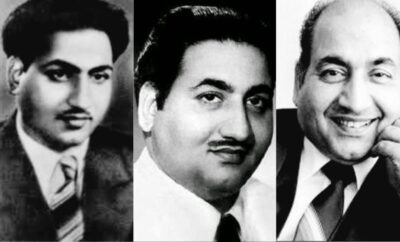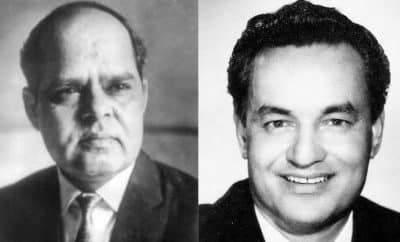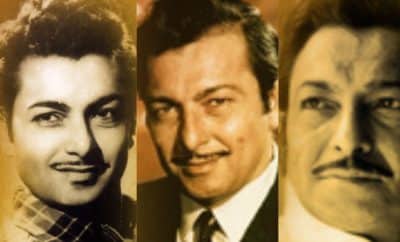Legends
Barsaat – And It Started Raining Melodrama and Music!
The journey of Hindi cinema from the studio-confined classics in the early years to the modern-day tech-savvy and larger-than-life Bollywood films has been through many stages of evolution and revolution, with quite a few milestones. These milestones are attributable to some visionary artists, who thought beyond obvious and dared to deviate from the path of tried and tested formulae.
Barsaat (1949), starring Raj Kapoor, Nargis, Nimmi and Prem Nath in the lead roles, was one such milestone. Raj Kapoor’s first hit as a producer and director after his debut Aag (1948). The film that truly announced the arrival of one of the most celebrated banners of Hindi cinema – RK Films, and the greatest showman of Indian cinema – Raj Kapoor. A milestone in melodramatic yarn-spinning. A milestone in music. The debut of the pathbreaking composer duo Shankar – Jaikishan. The debut of the master of narrating deep philosophy in simple words, Kaviraj Shailendra and the king of romance, Hasrat Jaipuri. The debut of the yesteryear’s veteran actress Nimmi. The first film to be ever filmed in Kashmir valley. The film that gave Lata Mangeshkar the true name and fame, following the recognition that she had gained with “Aayega aanewaala” from Mahal (1949). Mukesh, who had already found his feet as a playback singer also got immense popularity. The film that laid the foundation of a great team that went on to give many hits (films as well as songs), comprising Raj Kapoor, Nargis, Shankar – Jaikishan, Shailendra, Hasrat Jaipuri, Lata Mangeshkar and Mukesh. With Barsaat, it started raining melodramatic musical hits by Raj Kapoor and Shankar – Jaikishan.
Music was one of the film’s biggest strengths. Shankar – Jaikishan made an indelible mark with their very first soundtrack. They brought in a revolution of sorts in true sense to the film music, through their songs that were livelier and more intense than ever, decorated with the orchestration and the toe-tapping theka (beats) like never before. The new style of music and singing that seemed like a breath of fresh air to the entire nation overturned the dynamics of the film music and carved out a new path that many others followed later.
The composer Ram Ganguly had composed the soundtrack of Raj Kapoor’s debut Aag. It was obvious that he was engaged for the soundtrack of Barsaat as well. Shankar – Jaikishan were working as Ram Ganguly’s assistants on this project. However, he was cast out from the film due to a misunderstanding between him and Raj Kapoor, and the baton was handed over to Shankar – Jaikishan. There are several versions of the misunderstanding between Raj Kapoor and Ram Ganguly. Raju Bhartan’s version is that Ram Ganguly tried to use one of the tunes from Barsaat for another producer, and Lata Mangeshkar, who was present in the same recording studio, noticed this and alarmed Raj Kapoor. As per the book “Radhu Karmakar – The Painter of Lights”, the auto biography of the celebrated cinematographer Radhu Karmakar, Raj Kapoor wanted to use some compositions by Ram Ganguly’s assistants Shankar – Jaikishan for Barsaat, to which Ram Ganguly was not agreeable and walked out of the film. To quote what the well-known Marathi composer – singer and Lata Mangeshkar’s younger sister Meena Khadikar has mentioned in Lata Mangeshkar’s biography “Mothi Tichi Saavli”, Lata Mangeshkar noticed that almost all the work of Barsaat’s soundtrack, including composing the tunes and music arrangement, was being done by the composer’s young assistants Shankar – Jaikishan; and she suggested Raj Kapoor to rather consider the two young boys as the composers.
Whichever version is true, what remains undisputed is that Shankar – Jaikishan got an opportunity which they made the most of, and the rest is history!
Let us dive into the sumptuous decadal soundtrack composed by Shankar – Jaikishan comprising seven Lata solos, two Lata – Mukesh duets and one Rafi solo.
Out of the ten songs, six were written by Hasrat Jaipuri, only two by Shailendra and one each by Ramesh Shatri and Jalal Malihabadi. Intriguingly, the credit titles of the film mention only Shailendra and Hasrat Jaipuri as the lyricists.
Jalal Malihabadi wrote the adorable romantic Lata solo and one of the most famous songs from the soundtrack, “Mujhe kisi se pyaar ho gaya”, which was filmed on Nargis and Raj Kapoor. The song starts with Lata Mangeshkar competing in her innocent and fresh voice with the passionate runs of violins and then picks up to a brisk, foot tapping lovely composition with a violin-dominated orchestration.
Ramesh Shastri’s song “Hawa mein udta jaaye mora laal dupatta malmal ka” remains popular to date, even after seven and a half decades of its release and is still enjoyed by the current generation, albeit through recreations and remixes. The song is filmed on Bimla Kumari.
Both Jalal Malihabadi and Ramesh Shastri never appeared in Shankar – Jaikishan’s music again. While Jalal Malihabadi was seen occasionally in a few movies later, Ramesh Shastri vanished from Hindi cinema in a couple of years after Barsaat.
Raj Kapoor had noticed Shailendra, then working as an apprentice with Indian Railways, when he was reciting his poem “Jalta hai Punjab” in a mushaira and offered to pay him for using the poem in Aag. However, Shailendra was wary of mainstream cinema and refused the offer. A few days later, when Shailendra’s wife got pregnant, he was in need of money and approached Raj Kapoor. He was paid five hundred rupees to write the two songs for Barsaat, which were yet to be written.
One of Kaviraj Shailendra’s two songs is “Barsaat mein hum se mile tum sajan”, sung by Lata Mangeshkar and chorus. The song is filmed on Nimmi, Raj Kapoor and Prem Nath.
That was the era when the film songs had to be recorded twice – once for the film and then for the music records (the records had the limited capacity to hold only 3-minute-long songs). All the Barsaat songs were already recorded for picturisation. However, when this song was to be recorded again for the HMV records, the chorus group did not show up in the studio. Then the words “Taak dhina dhin” were sung by Raj Kapoor and Meena Khadikar, who had companied Lata Mangeshkar to the recording studio. Thus, what people heard as the chorus on the record was Raj Kapoor and Meena Khadikar’s voices.
The other song penned by Shailendra is the Lata – Mukesh duet “Patli kamar hai, tirchhi nazar hai”, filmed on Cuckoo, Prem Nath and Nimmi. The song is a blend of two moods. On one side, Prem Nath is seen having a good time in a bar, flaunting in Mukesh’s voice, his detached and carefree playboy-type approach; and the devastated Nimmi grieving in Lata Mangeshkar’s voice, waiting for Prem Nath to fulfil his promise and return to meet her. The subtle shift in the orchestration with the mood-shifts is commendable, and Cuckoo’s graceful dance is the highlight of the song.
Hasrat Jaipuri, who was working as a bus conductor to make the ends meet, was noticed by Prithviraj Kapoor in a mushaira, and recommended him to Raj Kapoor, who was just planning Barsaat.
As a debutant, Hasrat Jaipuri got to write majority of the songs – six out of 10!
The Lata solo “Jiya beqaraar hai, chhaayi bahaar hai”, showing Nimmi’s eager wait for her beloved, is perhaps the most remarkable in this lot.
“Meri aankhon mein bas gaya koi” is Nargis’ cute expression of the sweet pain of love, in Lata Mangeshkar’s saccharine and adolescent voice.
The Rafi solo “Main zindagi mein hardam rota raha hoon” is a sad background song showing the plight of the desolate Raj Kapoor and Nargis. Hasrat Jaipuri describes the magnitude of Raj Kapoor’s tears brilliantly through the line – “Sharmaayi meri aankh se saawan ki ghataayen”.
The two Lata solos – “Ab mera kaun sahaara” and “Bicchde huye pardesi, ik baar to aana tu” are the melancholic numbers, both filmed on Nargis.
Hasrat Jaipuri also wrote the other Lata – Mukesh duet, “Chhod gaye baalam, mujhe haaye akela chhod gaye”, expressing Raj Kapoor’s compliant about Nargis for estranging him and Nargis’ explanations, as she is bullied into marrying a scary mountain man against her will. The orchestration and Lata Mangeshkar’s high pitched aalaps are quite impactful.
Interestingly, four out of the six songs written by the king-of-romance-to-be are sad songs!
It has been 75 years and the film and its music continue to be fondly remembered. The classics like Barsaat will remain relevant and will be appreciated by connoisseurs for many more decades to come!




Effie4463
April 16, 2025 at 7:10 pm
https://myteana.ru/forums/index.php?autocom=gallery&req=si&img=6615
Jayden1594
April 19, 2025 at 6:27 am
https://vitz.ru/forums/index.php?autocom=gallery&req=si&img=4900
Aria1889
April 19, 2025 at 7:05 am
https://vitz.ru/forums/index.php?autocom=gallery&req=si&img=4911
Drake4354
April 20, 2025 at 12:06 pm
http://wish-club.ru/forums/index.php?autocom=gallery&req=si&img=5401
Marcus4138
April 26, 2025 at 1:21 pm
https://vitz.ru/forums/index.php?autocom=gallery&req=si&img=5031
Alanna1650
April 26, 2025 at 1:22 pm
https://mazda-demio.ru/forums/index.php?autocom=gallery&req=si&img=6559
Cole2993
April 29, 2025 at 3:46 pm
http://terios2.ru/forums/index.php?autocom=gallery&req=si&img=4549
Roberto640
April 29, 2025 at 3:47 pm
https://vitz.ru/forums/index.php?autocom=gallery&req=si&img=4814
Elinor1467
May 2, 2025 at 4:41 pm
http://toyota-porte.ru/forums/index.php?autocom=gallery&req=si&img=3340
Marian1139
May 2, 2025 at 4:43 pm
http://terios2.ru/forums/index.php?autocom=gallery&req=si&img=4733
Alissa3282
May 5, 2025 at 3:07 am
http://toyota-porte.ru/forums/index.php?autocom=gallery&req=si&img=3330
Jessica1642
May 5, 2025 at 3:08 am
http://wish-club.ru/forums/index.php?autocom=gallery&req=si&img=5382
Dominic396
May 5, 2025 at 4:26 pm
https://honda-fit.ru/forums/index.php?autocom=gallery&req=si&img=7186
Asher3568
May 5, 2025 at 4:27 pm
https://honda-fit.ru/forums/index.php?autocom=gallery&req=si&img=7193
Israel1421
May 8, 2025 at 11:54 am
https://vitz.ru/forums/index.php?autocom=gallery&req=si&img=4842
Kiera221
May 19, 2025 at 3:45 pm
https://honda-fit.ru/forums/index.php?autocom=gallery&req=si&img=7302
Hugo4109
May 19, 2025 at 3:47 pm
http://toyota-porte.ru/forums/index.php?autocom=gallery&req=si&img=3381
Charlotte2152
May 19, 2025 at 3:51 pm
https://hrv-club.ru/forums/index.php?autocom=gallery&req=si&img=7161
Adrian77
May 19, 2025 at 5:01 pm
https://mazda-demio.ru/forums/index.php?autocom=gallery&req=si&img=6632
Hugo870
May 23, 2025 at 5:34 am
Звонкий – Shine скачать песню в mp3 и слушать онлайн https://shorturl.fm/i2qM3
June995
May 23, 2025 at 6:04 am
Мария Пахоменко – Шагает, шагает скачать песню бесплатно в mp3 и слушать онлайн https://shorturl.fm/C6NUL
Jacob4174
May 23, 2025 at 6:25 am
Vera Pisareva – Мороз скачать бесплатно mp3 и слушать онлайн https://shorturl.fm/DrDRu
Mitchell4832
May 23, 2025 at 6:25 am
Инна Литвин – Назначаю Лучшим (DJ Baloo Radio Remix) скачать mp3 и слушать онлайн бесплатно https://shorturl.fm/XZLCl
Corey4105
May 23, 2025 at 7:34 am
HammAli & Navai – Прятки скачать и слушать песню https://shorturl.fm/RWNWh
Angie1800
May 23, 2025 at 8:52 am
УГАДАЙКТО feat. Джизус – ЭШ скачать mp3 и слушать онлайн бесплатно https://shorturl.fm/VpI4i
Brooks2365
May 23, 2025 at 1:14 pm
Денис Майданов – Автономка скачать песню на телефон и слушать бесплатно https://shorturl.fm/y2cFK
Dominique953
May 27, 2025 at 1:15 pm
https://mazda-demio.ru/forums/index.php?autocom=gallery&req=si&img=6475
Ralph3229
May 27, 2025 at 1:23 pm
http://terios2.ru/forums/index.php?autocom=gallery&req=si&img=4642
Tracy2665
May 27, 2025 at 1:45 pm
http://wish-club.ru/forums/index.php?autocom=gallery&req=si&img=5246
Molly3568
May 27, 2025 at 1:52 pm
http://terios2.ru/forums/index.php?autocom=gallery&req=si&img=4780
Elaine1926
May 27, 2025 at 2:04 pm
https://myteana.ru/forums/index.php?autocom=gallery&req=si&img=6785
Chase1832
May 27, 2025 at 3:04 pm
http://passo.su/forums/index.php?autocom=gallery&req=si&img=4283
Hector2471
May 31, 2025 at 5:50 am
https://honda-fit.ru/forums/index.php?autocom=gallery&req=si&img=7077
Samuel2723
May 31, 2025 at 5:53 am
https://honda-fit.ru/forums/index.php?autocom=gallery&req=si&img=7189
Mike4862
May 31, 2025 at 5:53 am
http://passo.su/forums/index.php?autocom=gallery&req=si&img=4330
Khloe16
May 31, 2025 at 6:00 am
http://toyota-porte.ru/forums/index.php?autocom=gallery&req=si&img=3371
Lora4411
May 31, 2025 at 7:06 am
https://honda-fit.ru/forums/index.php?autocom=gallery&req=si&img=7270
Lucia4884
June 2, 2025 at 11:49 pm
Zaza – Мари скачать бесплатно mp3 и слушать онлайн https://shorturl.fm/PrHsU
Jake1082
June 2, 2025 at 11:51 pm
Татьяна Буланова – Скайп скачать бесплатно mp3 и слушать онлайн https://shorturl.fm/Fo0sf
Fernando789
June 3, 2025 at 12:24 am
Маракеш – Вай, Какая скачать и слушать mp3 https://shorturl.fm/UWX7b
Caleb2470
June 3, 2025 at 12:24 am
Tamro – Ты Мой скачать бесплатно и слушать онлайн https://shorturl.fm/gtRok
Clifton4117
June 3, 2025 at 2:21 am
Илья Гуров – Экзюпери скачать и слушать mp3 https://shorturl.fm/b55wB
Karina1133
June 3, 2025 at 2:40 am
Рада Рай Feat. Алексей Петрухин – Рвутся Cтруны скачать песню и слушать бесплатно https://shorturl.fm/O0eCn
Carly3608
June 3, 2025 at 3:52 am
Sam Wick – Белые льдины скачать песню на телефон и слушать бесплатно https://shorturl.fm/Fa2JG
Rick2624
June 3, 2025 at 4:53 am
Клава Кока – Замуж (Dj. Prezzplay & Dj. Ser Radio Edit) скачать и слушать песню https://shorturl.fm/u2saF
Pat351
June 3, 2025 at 5:25 am
Шестое Чувство – Ненавидишь скачать песню бесплатно в mp3 и слушать онлайн https://shorturl.fm/6cuGH
Dillon4893
June 3, 2025 at 5:26 am
Тутси – Такси скачать песню и слушать бесплатно https://shorturl.fm/SPg9s
Connor2303
June 12, 2025 at 2:23 am
TheRealG feat. Дипсай & GSG – Шау скачать песню и слушать онлайн
https://allmp3.pro/2490-therealg-feat-dipsaj-gsg-shau.html
Amelia4651
June 12, 2025 at 2:29 am
Маракеш feat. Кравц – Химия скачать песню и слушать онлайн
https://allmp3.pro/3256-marakesh-feat-kravc-himija.html
Reese4327
June 12, 2025 at 3:00 am
Вова Бровкин – Голодная скачать песню и слушать онлайн
https://allmp3.pro/3116-vova-brovkin-golodnaja.html
Kathryn4071
June 12, 2025 at 4:19 am
KENA – Мне просто нужен ты (Silver Ace & Salandir Remix) скачать песню и слушать онлайн
https://allmp3.pro/2994-kena-mne-prosto-nuzhen-ty-silver-ace-salandir-remix.html
Hadley494
June 12, 2025 at 6:51 am
Маша Кольцова – Море скачать песню и слушать онлайн
https://allmp3.pro/3222-masha-kolcova-more.html
Renee4437
June 12, 2025 at 7:49 am
Nataliya – Истерика скачать песню и слушать онлайн
https://allmp3.pro/3119-nataliya-isterika.html
Will3366
June 12, 2025 at 8:16 am
JONY – Титры скачать песню и слушать онлайн
https://allmp3.pro/3024-jony-titry.html
Jayden765
June 12, 2025 at 12:22 pm
Дэя – Нарисуй скачать песню и слушать онлайн
https://allmp3.pro/3091-djeja-narisuj.html